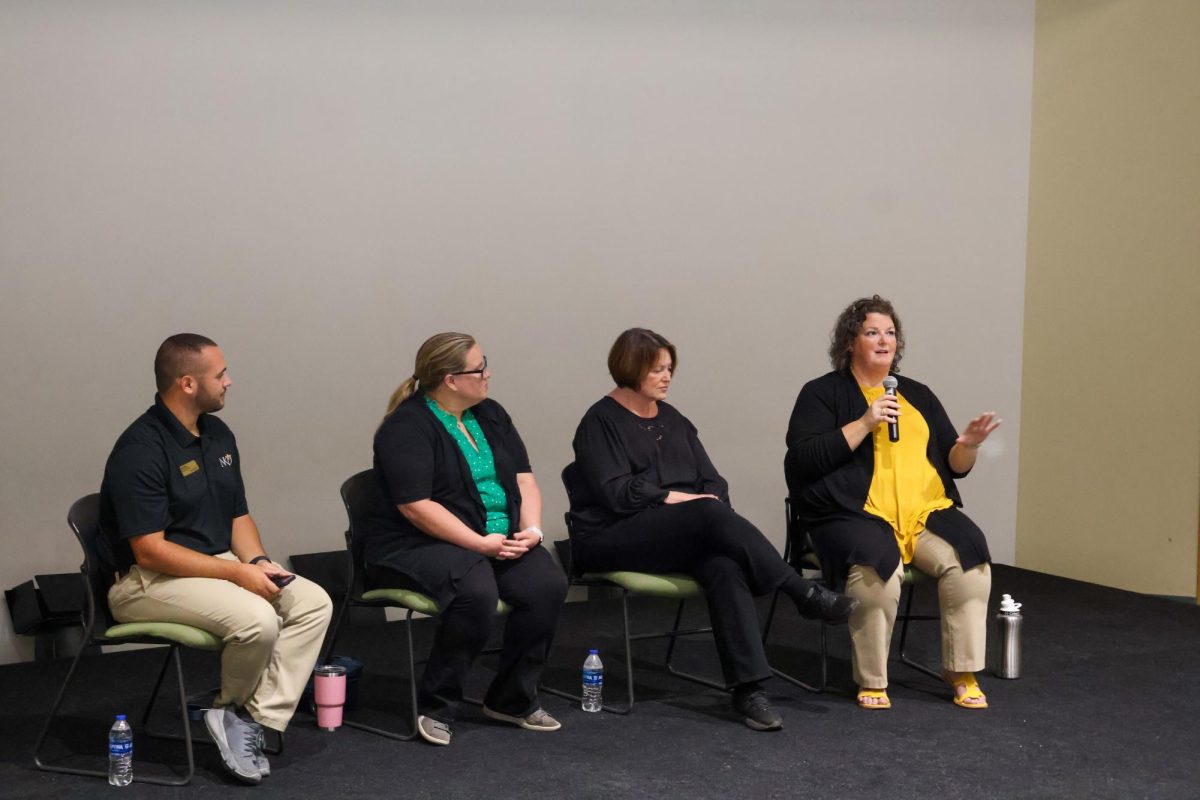NKU Scripps Howard Center for Civic Engagement hosted both a discussion with faculty members regarding the 2024 Presidential Debate as well as a watch party on Tuesday night. Vice president of the student government association (SGA) Collin Jarrell asked panelists Annie Hammock, Stacie Jankowski and Shauna Reilly a variety of questions.
Hammock has been in the field of journalism for over 40 years and is now the faculty adviser for The Northerner. Jankowski, a former reporter, is also a journalism faculty member. Reilly is a faculty member in political science and assistant provost for Experiential Learning.
Jarrell started the discussion by asking what the panelists were looking forward to with the debate.
Jankowski said one thing that is interesting with this debate is that Vice President Kamala Harris has not done a debate yet.
“This is a new frontier for the Democrats,” she said. “Seeing how their candidate is going to stack up to Trump and what this is actually going to look like.”
The journalism professor elaborated, mentioning the previous debate between former President Donald Trump and current President Joe Biden.
“It didn’t go well for [Democrats] in the last debate,” she explained. “So there’s certainly a lot of anticipation, but probably a lot of apprehension as well.”
Hammock echoed Jankowski in saying, “It’s a chance for us to see how [Harris] reacts under pressure.”
Reilly said she was excited to see how the two candidates “play off each other.”
“We’ve not seen both of them on stage. This may be the only time we get to see them side by side,” Reilly said.
“Body language, that’s always my favorite part of debates,” she continued. “Just watching the physicality of the candidates.”
Jarrell asked Hammock to discuss her experience as a journalist covering political campaigns.
“I’ve covered a lot of debates over the years, and what I have found is there’s the same talking points, almost election to election,” Hammock said. “The details might change here and there, and you might get more extreme with one or the other, but they’re basically the same parties they were 40 years ago.”
Hammock explained that the benefit of debates is having a moderator that “drills” candidates and takes them off of their “talking points” often used during rallies and campaign trails.
Jankowski was asked about how her research surrounding the anticipation of the 2020 election has impacted her expectations for the 2024 debate. Her research revolved around the memes that were created from election day in 2020 to the night that the election was officially called for Biden.
“I’m interested in storytelling. Who’s creating the story? What are our audiences saying about the story? What are the memes that come up,” Jankowski explained. “There will be memes that come out of this debate, for better or for worse, right? And that adds to the popular consciousness of what happened.”
“We remember the little things about the debate,” Reilly said.
“As citizens, one of the things that we need to keep in mind is that sometimes the things that they seize upon to make the most important, aren’t the things that are the most important,” Jankowski said.
When asked about who the debate is geared toward, the panelists echoed each other in saying it is for the “undecided voter.”
“Tonight will answer a lot of questions for those Democrats who have said, ‘I don’t know enough about Harris. I need to know more,’” said Hammock.
Jarrell asked Reilly specifically about her thoughts on the effects the youth vote will have on this election.
“Before Biden dropped out of the race, I referred to this race as a snooze-fest because it was two 70, 80-year-old men up there debating,” Reilly said. “That’s not motivating for young voters.”
Reilly expressed concern for the low number of young voters in previous elections and said that in the last few months, young voters have become more involved, but that getting them out to the polls is another challenge.
The political science professor said that a variety of NKU groups and organizations have been working to educate more young voters and urge them to register to vote.
“Just thinking about ‘what do we want America to look like,’” she said. “So how do you shape your futures to that? It’s by voting.”


